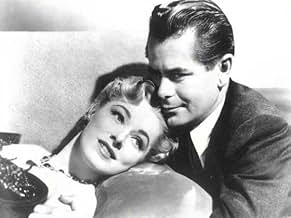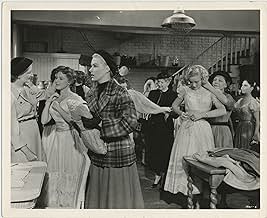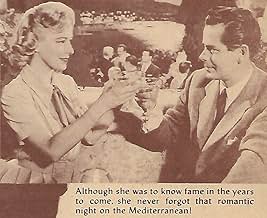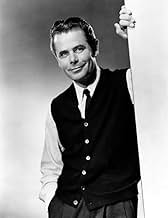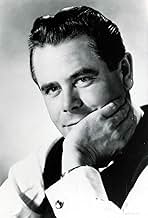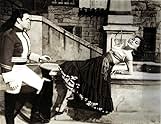AVALIAÇÃO DA IMDb
6,7/10
1,3 mil
SUA AVALIAÇÃO
Adicionar um enredo no seu idiomaThis movie chronicles Australian-born opera star Marjorie Lawrence's success, her battle with polio, and her eventual career comeback.This movie chronicles Australian-born opera star Marjorie Lawrence's success, her battle with polio, and her eventual career comeback.This movie chronicles Australian-born opera star Marjorie Lawrence's success, her battle with polio, and her eventual career comeback.
- Direção
- Roteiristas
- Artistas
- Ganhou 1 Oscar
- 1 vitória e 3 indicações no total
Phyllis Altivo
- Louise
- (não creditado)
Benjie Bancroft
- Doctor
- (não creditado)
Francis Barnes
- Singer
- (não creditado)
Louise Bates
- Party Guest
- (não creditado)
Mary Bayless
- Backstage Well-Wisher
- (não creditado)
George Blagoi
- Audience Member
- (não creditado)
Heinz Blankenburg
- Baritone
- (não creditado)
Lulu Mae Bohrman
- Backstage Well-Wisher
- (não creditado)
- Direção
- Roteiristas
- Elenco e equipe completos
- Produção, bilheteria e muito mais no IMDbPro
Avaliações em destaque
I am a great-niece of Marjorie Lawrence. It's a very sad fact that Marjorie is best known outside of Australia. However, she was recently honored as one of 100 Australian Entertainers of the Century. It's also a bit of a shame that this movie is a Hollywood producer's interpretation of an American publisher's version of my Great-Aunt's life. The real family story is actually much more interesting. Auntie Marj never smoked a cigarette in her life - but it seems everyone smoked in the movies of the 50s. My mother and my aunt attended the world premiere here in Melbourne. I remember meeting Auntie Marj as a child in the 70s.
Eleanor Parker, a much underrated actress of the 1950s, probably hit the high point of her career when she essayed the role of Marjorie Lawrence in this biographical portrait.
Marjorie Lawrence was an Australian opera star whose career was cruelly interrupted by polio in the 1930s. The film follows Lawrence from her winning a singing contest in her native Winchelsea, Australia through her career with the Metropolitan Opera and her struggle with regaining her health. Lawrence is supported every step of the way by husband Dr. Thomas King,ably played by Glenn Ford. But it's Eleanor Parker's movie all the way.
Funny for a movie about an Australian, Parker doesn't even attempt an Australian accent. This is in the MGM tradition of Clark Gable who did not attempt any British accent in Mutiny on the Bounty. It worked just as well for Parker, though I'd be curious what a native Australian might think. Lawrence was the second female opera star who became a national treasure for Australia, the first being Nellie Melba. Parker shouldered a lot of tradition in this film and did it well.
The voice used by Parker for the operatic sequences is that of Eileen Farrell of the Metropolitan Opera. The sequences are well done, but the real drama in the scenes of Lawrence battling polio.
This film coincidentally enough came out at the same time that Dr. Jonas Salk discovered his vaccine preventive for polio. I still remember as a lad getting those polio shots at my public school. No movie studio could have planned that coincidence, but MGM reaped enormous profit because of it. As for Jonas Salk, no man of medicine has ever been admired in the same way in my lifetime.
Eleanor Parker was nominated for best actress, but lost that year to Anna Magnani in The Rose Tattoo. Look for a young Roger Moore in the role of Parker's brother and business manager.
My favorite scene in the whole film is Parker as Lawrence entertaining the troops overseas in World War II. Especially when she sings Waltzing Matilda to her native Australian diggers. It was like the whole beating heart of the Australian continent coming alive for an instant. Absolutely inspired.
This film gets the highest possible recommendation from me.
Marjorie Lawrence was an Australian opera star whose career was cruelly interrupted by polio in the 1930s. The film follows Lawrence from her winning a singing contest in her native Winchelsea, Australia through her career with the Metropolitan Opera and her struggle with regaining her health. Lawrence is supported every step of the way by husband Dr. Thomas King,ably played by Glenn Ford. But it's Eleanor Parker's movie all the way.
Funny for a movie about an Australian, Parker doesn't even attempt an Australian accent. This is in the MGM tradition of Clark Gable who did not attempt any British accent in Mutiny on the Bounty. It worked just as well for Parker, though I'd be curious what a native Australian might think. Lawrence was the second female opera star who became a national treasure for Australia, the first being Nellie Melba. Parker shouldered a lot of tradition in this film and did it well.
The voice used by Parker for the operatic sequences is that of Eileen Farrell of the Metropolitan Opera. The sequences are well done, but the real drama in the scenes of Lawrence battling polio.
This film coincidentally enough came out at the same time that Dr. Jonas Salk discovered his vaccine preventive for polio. I still remember as a lad getting those polio shots at my public school. No movie studio could have planned that coincidence, but MGM reaped enormous profit because of it. As for Jonas Salk, no man of medicine has ever been admired in the same way in my lifetime.
Eleanor Parker was nominated for best actress, but lost that year to Anna Magnani in The Rose Tattoo. Look for a young Roger Moore in the role of Parker's brother and business manager.
My favorite scene in the whole film is Parker as Lawrence entertaining the troops overseas in World War II. Especially when she sings Waltzing Matilda to her native Australian diggers. It was like the whole beating heart of the Australian continent coming alive for an instant. Absolutely inspired.
This film gets the highest possible recommendation from me.
This film will always have a great significance to me because it introduced me to the beauty of opera. Marjorie Lawrence was a major soprano with the Metropolitan Opera, and her career was cut short by polio while she was still in her vocal prime. Her story is told with great sensitivity and warmth. The operatic scenes are done to perfection, with the superb soprano Eileen Farrell doing the vocals. Eleanor Parker is seen here in what must be her greatest work as an actress. Parker was a great, if somewhat under-appreciated actress, and she was a beautiful woman. Of course, it is she who dominates the movie. Glenn Ford provides excellent support as her doctor husband who guides her back to her career. When this film was released, I was ten years old, and kept going back again and again to see it over and over. I loved the music, loved the story, and will forever be indebted to it for having introduced me to the beauty of grand opera. If I had to choose a film as the most important of my life, it would have to be this one.
The film does a fine job with the crippling illness of Lawrence and her comeback onstage, but most notable are the performances by the stars. Glenn Ford and Eleanor Parker were never better. Just superb. The scene where she tried to commit suicide and Ford stopped her, broke down, and asked God for help is magnificent and a must-see. Ford and Parker should be well-remembered as excellent actors.
I was fortunate enough to be chosen as the stunt double for Eleanor Parker in this extraordinary film. I was in awe of her performance and cannot say how much I enjoyed working with her for several of her films. I thought the script was marvelous and did win an award I believe. Eleanor Parker is the true lady she portrayed in this once in a lifetime film. I never tire of seeing it - over and over again.
Você sabia?
- CuriosidadesEleanor Parker can read music, and has perfect pitch as a singer. She decided to study the scores of the opera songs used in this movie on her own. She rented a cabin in Lake Arrowhead, California, and played the records while singing along, until she had the breathing and phrasing memorized. Then when filming the scenes, instead of lip-synching to the tracks recorded by Eileen Farrell for the movie, she sang full voice (but an octave lower). She is proud of the fact that they never had to do a re-take, in order to "match" the tapes. She nailed it on the first take every time.
- Erros de gravaçãoAfter Marjorie sings "Annie Laurie" and she wheels herself into the kitchen and she suggests a concert tour, right as she and Dr. King are embracing .
- Citações
Marjorie Lawrence: [drinking champagne] Tonight I love the whole world and I want them to know it.
Dr. Thomas King: And tomorrow you'll have a monumental hangover.
Marjorie Lawrence: That's the advantage of going out with doctors.
- ConexõesFeatured in 1955 Motion Picture Theatre Celebration (1955)
- Trilhas sonorasDon Carlos
(1867) (uncredited)
Music by Giuseppe Verdi
Libretto by François Joseph Méry and Camille du Locle
Aria "O don fatale" Performed by Eleanor Parker (dubbed by Eileen Farrell) with piano accompaniment
Principais escolhas
Faça login para avaliar e ver a lista de recomendações personalizadas
- How long is Interrupted Melody?Fornecido pela Alexa
Detalhes
- Data de lançamento
- País de origem
- Idiomas
- Também conhecido como
- La melodía interrumpida
- Locações de filme
- Empresa de produção
- Consulte mais créditos da empresa na IMDbPro
Bilheteria
- Orçamento
- US$ 2.367.000 (estimativa)
- Tempo de duração1 hora 46 minutos
- Proporção
- 2.55 : 1
Contribua para esta página
Sugerir uma alteração ou adicionar conteúdo ausente

Principal brecha
By what name was Melodia Interrompida (1955) officially released in India in English?
Responda


